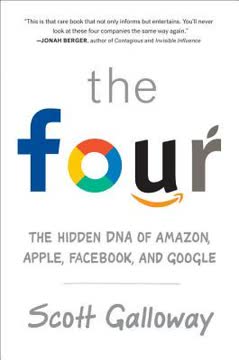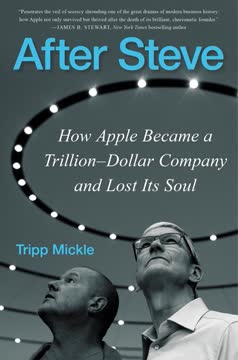Key Takeaways
1. Instagram's origins: From bourbon-inspired app to Facebook acquisition
"We're looking to have a level of impact on the world that is unmatched by any other company, and in order to do that we can't sit around and act like we've made it."
From Burbn to Instagram. Kevin Systrom and Mike Krieger's journey began with a location-based app called Burbn. Realizing its limitations, they pivoted to focus solely on photo-sharing, launching Instagram in October 2010. The app's rapid growth caught the attention of tech giants, including Facebook's Mark Zuckerberg.
The billion-dollar deal. In April 2012, Facebook acquired Instagram for $1 billion, a move that shocked the tech world. The acquisition promised resources and independence for Instagram, but also set the stage for future tensions between the two companies' cultures and leadership styles.
- Key factors in Instagram's early success:
- Simple, focused product (photo-sharing with filters)
- Timing (rise of smartphone cameras)
- Strategic partnerships and celebrity adoption
2. The rise of influencer culture and its impact on society
"Instagram is not for half-eaten sandwiches."
The birth of influencers. Instagram's visual nature and growing user base created a new breed of digital celebrities. These "influencers" built personal brands and monetized their followings, transforming social media into a powerful marketing tool.
Reshaping industries and behavior. The pursuit of "Instagrammable" experiences began to influence various sectors, from travel and hospitality to fashion and food. Users increasingly curated their lives for public consumption, blurring the lines between authenticity and performance.
- Impact of influencer culture:
- Rise of sponsored content and brand partnerships
- Transformation of travel destinations and experiences
- Pressure on users to present idealized versions of their lives
- Creation of new career paths and business opportunities
3. Facebook's growing influence and Instagram's struggle for independence
"Facebook was like the big sister that wants to dress you up for the party but does not want you to be prettier than she is."
Tension builds. As Instagram grew in popularity and revenue potential, Facebook began to assert more control over its subsidiary. This led to conflicts over resources, product decisions, and overall strategy.
The founders' departure. In September 2018, Kevin Systrom and Mike Krieger announced their resignation from Instagram, citing a desire to explore new creative projects. Their departure marked the end of Instagram's relative independence within Facebook.
- Key points of contention:
- Resource allocation and hiring decisions
- Integration of Facebook features into Instagram
- Concerns about "cannibalization" of Facebook's user base
- Differing philosophies on product development and user experience
4. The evolution of Instagram's features and algorithmic feed
"Instagram users own their content and Instagram does not claim any ownership rights over your photos."
From filters to Stories. Instagram's product evolved from a simple photo-sharing app with filters to a robust platform featuring video, direct messaging, and ephemeral content (Stories). These additions helped Instagram compete with rivals like Snapchat and maintain user engagement.
The algorithmic shift. In 2016, Instagram replaced its chronological feed with an algorithm-based one, prioritizing content based on user behavior and relationships. This change sparked controversy but ultimately increased user engagement and time spent on the app.
- Major feature introductions:
- Video sharing (2013)
- Instagram Direct messaging (2013)
- Stories (2016)
- IGTV (2018)
- Algorithmic feed (2016)
5. Instagram's role in shaping modern communication and self-expression
"Instagram is this mirror on ourselves, and it allows each of us to contribute our own experience to the understanding of this world."
Visual storytelling. Instagram transformed how people communicate and share experiences, emphasizing visual content over text. This shift influenced language, with new terms like "Instagrammable" entering the lexicon.
Personal branding. The platform enabled users to curate and present their lives as personal brands, affecting how people view themselves and others. This led to both positive creativity and negative pressure to maintain an idealized image.
- Instagram's impact on communication:
- Rise of visual-first storytelling
- Emergence of new social norms and etiquette
- Influence on language and cultural references
- Democratization of content creation and distribution
6. The dark side of Instagram: Mental health concerns and addiction
"I don't know what real skin looks like anymore."
Comparison and inadequacy. The constant exposure to curated, idealized images on Instagram has been linked to increased feelings of anxiety, depression, and low self-esteem, particularly among young users.
Addiction and overuse. Instagram's design, like many social media platforms, incorporates features that can lead to addictive behavior. The pursuit of likes, followers, and engagement can create unhealthy patterns of use and affect real-world relationships.
- Mental health concerns:
- Body image issues and unrealistic beauty standards
- FOMO (Fear of Missing Out) and social anxiety
- Addiction to validation through likes and followers
- Cyberbullying and online harassment
7. Instagram's future: Balancing growth, ethics, and user well-being
"The most important question we face is, are we good for people?"
Ethical challenges. As Instagram continues to grow, it faces increasing scrutiny over its impact on society, mental health, and privacy. The platform must navigate these concerns while maintaining its business model and user engagement.
Regulatory pressure. Instagram's dominance in social media, combined with Facebook's ownership, has led to antitrust concerns and calls for increased regulation. The company must address these challenges while continuing to innovate and compete in a rapidly evolving digital landscape.
- Key challenges for Instagram's future:
- Addressing mental health concerns and addiction
- Balancing user privacy with personalized experiences
- Navigating potential antitrust regulations
- Maintaining authenticity and trust in an era of misinformation
- Evolving the platform to meet changing user needs and expectations
Last updated:
FAQ
What's No Filter: The Inside Story of Instagram about?
- Inside Instagram's Journey: The book narrates Instagram's evolution from a startup to a major social media platform, detailing its creation, growth, and acquisition by Facebook.
- Cultural Impact: It explores Instagram's influence on modern culture, particularly in photography, branding, and influencer marketing, and how it changed online self-presentation.
- Business Dynamics: The narrative examines Instagram's business strategies, contrasting its user engagement and advertising approach with Facebook's methods.
Why should I read No Filter: The Inside Story of Instagram?
- Comprehensive Insight: Gain an in-depth understanding of Instagram's rise, based on interviews with key figures, offering firsthand accounts and insights.
- Lessons in Entrepreneurship: Learn valuable lessons about navigating the tech industry, managing growth, and maintaining brand identity amidst corporate pressures.
- Cultural Relevance: Essential for understanding social media's evolution and its societal impact, highlighting the intersection of technology, culture, and personal branding.
What are the key takeaways of No Filter: The Inside Story of Instagram?
- Power of Simplicity: Emphasizes the importance of simplicity in design and user experience, which was crucial to Instagram's appeal.
- Community Engagement: Highlights the significance of building a community around a product, focusing on user-generated content and relationships.
- Navigating Corporate Culture: Discusses the challenges of maintaining a startup's culture within a larger corporation like Facebook.
How did Instagram's founders, Systrom and Krieger, come up with the idea for the app?
- Background in Technology: Both founders had strong tech backgrounds, with Systrom at Google and Krieger in engineering, equipping them to create a mobile app.
- Initial Concept: Originally a location-based app called Burbn, they pivoted to focus on photo sharing after recognizing its potential.
- Influence of Photography: Systrom's passion for photography and filters shaped Instagram's aesthetic, aiming to make photography accessible and enjoyable.
How did Instagram's acquisition by Facebook impact its development?
- Resource Access: The acquisition provided Instagram with Facebook's resources, accelerating growth and feature implementation.
- Corporate Tensions: Tensions arose as Facebook's priorities conflicted with Instagram's vision, challenging the founders' creative independence.
- Cultural Shift: Instagram adopted Facebook's data-driven approach, sometimes clashing with its initial focus on creativity and community.
What challenges did Instagram face after being acquired by Facebook?
- Maintaining Independence: Preserving Instagram's unique culture and identity within Facebook's ecosystem was a primary challenge.
- User Trust: Concerns about privacy and data handling required efforts to maintain user trust post-acquisition.
- Balancing Growth and Quality: Rapid growth necessitated scaling infrastructure and managing engagement without compromising user experience.
How did Instagram's approach to advertising differ from Facebook's?
- Focus on Aesthetics: Instagram prioritized visually appealing ads that blended with user content, maintaining a seamless user experience.
- Manual Approval Process: Initially used manual ad approval to ensure high-quality content, preserving platform integrity.
- Selective Partnerships: Partnered with brands aligning with its aesthetic, focusing on select advertisers to maintain artistic identity.
What role did community engagement play in Instagram's success?
- Building Relationships: Focused on fostering user relationships, creating a loyal user base through events like InstaMeets.
- User-Generated Content: Thrived on user-generated content, encouraging creativity and user contribution.
- Curation and Recognition: Actively curated content and recognized talented users, motivating others to improve their posts.
How did Instagram evolve its features over time?
- Introduction of Video: Launched video sharing in 2013, expanding capabilities and attracting a new audience.
- Direct Messaging: Added direct messaging for private communication, enhancing the social aspect and competing with other platforms.
- Advertising Features: Gradually introduced advertising features, maintaining a visually appealing experience while monetizing.
What impact did Instagram have on the influencer marketing industry?
- Rise of Influencers: Enabled individuals to build personal brands and monetize followings, changing marketing approaches.
- Authenticity and Engagement: Influencers focused on authenticity, sharing relatable content that resonated with audiences.
- New Business Models: Created new income opportunities through sponsored posts and partnerships, reshaping marketing strategies.
How did Instagram address issues of bullying and harassment?
- Comment Filtering Tools: Introduced features to filter or hide comments, aiming for a safer environment.
- Community Initiatives: Launched campaigns promoting kindness and positivity, encouraging supportive behavior.
- Ongoing Challenges: Despite efforts, challenges remain in fully addressing bullying due to the platform's scale.
What is the significance of Instagram Stories in its evolution?
- Game-Changer for Engagement: Stories allowed for spontaneous content, increasing user engagement and time spent on the app.
- Competitive Strategy: Introduced as a response to Snapchat, showcasing Instagram's adaptability and innovation.
- Cultural Shift: Encouraged sharing daily lives, fostering community and connection, influencing perceptions of authenticity.
Review Summary
No Filter chronicles Instagram's journey from startup to social media giant, exploring its founders' vision, acquisition by Facebook, and cultural impact. Readers praise Frier's engaging narrative style and insights into tech industry dynamics. The book reveals tensions between Instagram and Facebook, highlighting differences in company cultures and priorities. Many found it eye-opening regarding social media's influence on society, celebrity culture, and mental health. While some felt it lacked depth in certain areas, most considered it a compelling and informative read about a pivotal tech company.
Similar Books










Download PDF
Download EPUB
.epub digital book format is ideal for reading ebooks on phones, tablets, and e-readers.




